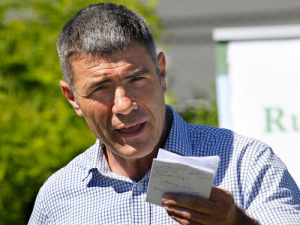The Government has dealt a body-blow to farmers and growers in pandering to its mates in the Green Party by axing funding to irrigation projects, says National’s agriculture spokesman Nathan Guy.
While existing commitments to three irrigation projects would be honoured, three others had been “left high and dry,” Guy told Rural News.
“That’s despite the fact many farmers, growers and councils in these areas have invested their own money and time to progress these localised schemes for over a decade. They’ve bent over backwards to meet the strict environmental consent conditions required to secure government backing.
“Many of those I’ve already spoken to feel this decision by the coalition Government is not in good faith and a real kick in the guts,” he says.
“In the case of Hunter Downs in South Canterbury, farmers have raised $40 million in capital knowing that if they met all the criteria they would secure the funding. This scheme was going to support 21,000ha of irrigation and it was designed to increase flows into Wainono lagoon and supply water to Timaru and Waimate townships.
“The Hurunui community in North Canterbury has battled through three years of continuous droughts that caused heaps of stress and anxiety. These farmers have persisted for over 18 years to get their water storage scheme close to design stage. It would have turbo-charged the region with 21,000ha of irrigable land -- most of it for sheep and beef production.
“The small Flaxbourne scheme of 2200ha east of Blenheim would have turned dry hill country carrying a handful of sheep into productive vineyards and arable crops.
“While [Finance Minister] Grant Robertson thinks he can dance through legal loopholes and ditch these three schemes, they have neglected their moral obligations.”
Guy claims agriculture minister Damien O’Connor had been “rolled by the Greens” and would forever be remembered as a weak minister of agriculture for not standing up for rural communities.
Robertson said the Government had begun winding down public funding for large-scale irrigation through Crown Irrigation Investments Ltd (CIIL), in line with the coalition agreement and the confidence and supply agreement.
“The decisions are the result of an extensive review of how to wind down funding through CIIL while honouring existing commitments, as provided for in the agreements signed on the formation of the Government. The decisions will provide certainty to the individual schemes which had applied for Government funding alongside private investment.”
Robertson said it represented a shift in priorities. Large-scale private irrigation schemes should be economically viable on their own.
“I recognise that this decision will be disappointing for proponents of projects that won’t be considered or progressed. However, a decision had to be taken on how to put into practice the agreements made on formation of the Government. It is important to remember that schemes may be able to continue, but the Government believes that public subsidies for large-scale private irrigation can instead be better directed to other areas of need.”
Robertson says “smaller-scale, locally run and environmentally sustainable water storage projects” could be considered on a case-by-case basis through the Provincial Growth Fund, due to the importance water plays in growing our provinces.
Minister of Agriculture Damien O’Connor says access to water is vital to NZ farmers, growers and rural communities that power the economy.
“My vision is for a resilient primary sector striving for value over volume; this means large-scale irrigation schemes must be environmentally and economically viable, with vital regional infrastructure supported by the Government.
“This will provide a good balance to ensure better outcomes for all New Zealanders.”



















